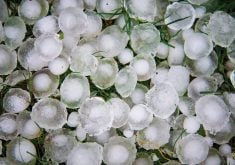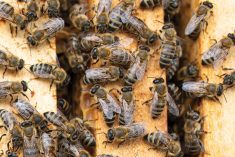Alberta’s newest meadery is doing things a little differently.
Along with a traditional honey wine, Tamarack Jack’s Honey and Meadery also produces a variation that might tempt those who prefer a brewskie to the so-called ‘drink of the gods.’
“We are a small apiary turned into a meadery just recently,” Katie Kingdon, manager of the family-owned operation, said during a recent ag tour organized by Clearwater County.
In addition to raw honey, spiced honey, bee pollen, and beard oil (a conditioner for facial hair), Tamarack Jack’s offers two types of mead.
“Buzzsaw is a traditional carbonated mead. Sawyer has added hops to it — they drink like a beer,” said Kingdon.
Like almost all beer makers in Alberta, the family is forced to go out of province — B.C. and Ontario are the big producers — to get their hops. But they hope to blaze a trail on that front, too, and are growing a test plot of hops.

“There are only one or two other growers of hops in Alberta due to the fact that they’re very hard to grow in Alberta,” Susan Kingdon, another family member involved in the operation, said as she showed off the test plot.
Hops don’t do well in chinooks and don’t like Alberta winters, she said.
“They would probably prefer a Zone 4 and up,” she said. “We’re a Zone 2, so we have to get some hardy ones.”
Hops are a perennial which need about three years before they’re established and able to produce a decent crop. Tamarack Jack’s is testing a variety called Nugget and it’s grown very well this summer. However, aphids and spider mites love hop plants and quickly discovered the newest (vegetative) resident of Clearwater County. Since they want to market Sawyer as a chemical-free product, the family is using sage and dish soap to concoct their own natural insecticide and that’s been working well, she said.
Read Also

Rural Alberta gets further boost to internet connectivity
The province and feds join forces to help remote/rural Albertans get connected to reliable high-speed internet through its Broadband Strategy.
Even though their meads only went on sale last month, the test plot of hops — which can grow a foot or two a week during summer and reach 30 feet in height — has drawn a steady stream of craft beer makers.
A 7,000-litre batch of mead requires five to 10 pounds of hops (which resemble green pine cones), and is brewed in a mead house. The facility is kept at 35 C as it allows the yeast to work faster and cuts the production time to three weeks (instead of four months).
The ingredients (which are just honey, water, and yeast) are put into tanks and sit for two to three weeks.
“When it reaches eight per cent alcohol content, that’s when we run it through a filter into our carbonation tanks,” said Katie Kingdon.
The end result is sold at their meadery located near Caroline, one liquor store in Didsbury, and farmers’ markets — although there’s been a lot of interest from local restaurants and pubs. It retails at $8 a bottle (or $195 for a 20-litre keg).
“Naturally, this misconception of mead is that it needs to be sweet,” she said. “So everybody expects mead to be a sugary, really sweet product. Ours is more dry.”
The taste varies according to the type of honey used.
“The cool part of being in Clearwater County is we produce the better quality of honey,” said one of the beekeepers at the operation. “With the wildflowers, you can stay away from canola because it really doesn’t flourish so much here.”
The family has 450 hives (with 30 colonies per quarter section of land) and the bees forage clover, alfalfa, fireweed, and other wildflowers.
















